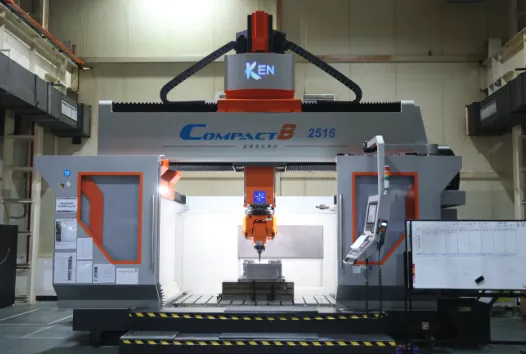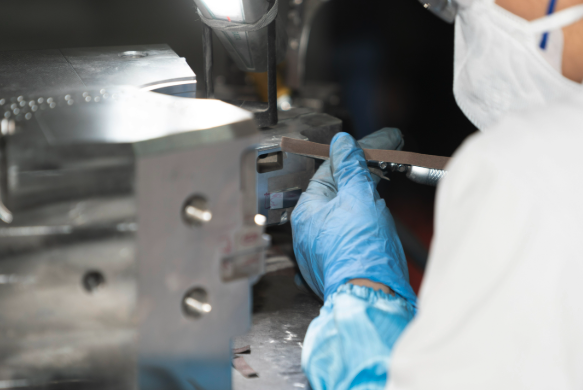Views: 0 Author: Site Editor Publish Time: 2025-07-10 Origin: Site
In modern precision manufacturing, CNC milling machines play a pivotal role in shaping high-quality components with exceptional accuracy and repeatability. As a core technology in subtractive manufacturing, CNC milling is widely used across industries such as automotive, aerospace, electronics, and home appliances. For companies like ZHUHAI GREE DAIKIN PRECISION MOLD CO., LTD. , CNC milling machines are essential to achieving the tight tolerances and complex geometries required in today’s competitive market.
This article explores the types of CNC milling machines, their working principles, applications, and how GreeDaikinMold leverages this technology to deliver world-class precision molds and components. We will also examine the latest trends in CNC milling, including automation, multi-axis machining, and smart manufacturing, and how they align with the evolving needs of global industries.

CNC (Computer Numerical Control) milling machines are automated machining tools that use rotating cutting tools to remove material from a workpiece. The movement of the machine is controlled by a computer program, which allows for high precision, repeatability, and complex part production.
Unlike manual milling, CNC milling machines can operate continuously with minimal human intervention, making them ideal for high-volume production and intricate designs. These machines are capable of producing parts with tolerances as tight as ±0.001 mm, which is critical in industries like mold making, aerospace, and medical device manufacturing.
CNC milling machines are classified based on their axis configuration, spindle orientation, and intended purpose. Each type offers unique advantages and is suited to specific manufacturing tasks.
In vertical CNC milling machines, the spindle is oriented vertically, perpendicular to the worktable. The cutting tool moves up and down (Z-axis), while the workpiece is secured on a table that moves in the X and Y directions. This configuration is one of the most widely used in the industry due to its simplicity, versatility, and cost-effectiveness.
| Feature | Vertical CNC Mill |
|---|---|
| Spindle Orientation | Vertical |
| Best For | Flat surfaces, pockets, holes, engraving |
| Advantages | Easy setup, good operator visibility, lower cost |
| Limitations | Limited access to complex 3D contours |
| Common Applications | Mold bases, brackets, plates, jigs |
Why It Matters:
Vertical mills are the backbone of many machining shops due to their reliability and ease of use. At GreeDaikinMold, they serve as a foundational tool in the early stages of mold fabrication, ensuring that base components are machined to exact specifications before more complex operations are performed.
In horizontal CNC milling machines, the spindle is oriented horizontally, parallel to the worktable. This configuration allows for heavy-duty cutting and is particularly effective for machining large or complex parts that require access to multiple sides in a single setup.
| Feature | Horizontal CNC Mill |
|---|---|
| Spindle Orientation | Horizontal |
| Best For | Heavy-duty cutting, multi-side machining |
| Advantages | High rigidity, excellent chip evacuation |
| Limitations | Higher cost, more complex setup |
| Common Applications | Automotive parts, large molds, gearboxes |
Why It Matters:
Horizontal mills offer superior stability and rigidity, which is essential when working with hardened tool steels or large workpieces. Their design also allows for better chip removal, reducing the risk of tool wear and thermal deformation. This makes them ideal for high-precision, high-load applications common in mold making.
3-axis CNC mills are the most common and widely used type of CNC machine. They operate along three linear axes: X (left-right), Y (forward-backward), and Z (up-down). These machines are capable of performing a wide range of milling operations, including drilling, tapping, and contouring.
| Feature | 3-Axis CNC Mill |
|---|---|
| Axes | X, Y, Z |
| Best For | Simple to moderate complexity parts |
| Advantages | Cost-effective, easy to program and operate |
| Limitations | Limited ability to machine undercuts or complex angles |
| Common Applications | Mold inserts, standard precision parts |
Why It Matters:
3-axis machines are the workhorses of CNC machining. They offer a great balance between capability and cost, making them suitable for a wide range of applications. At GDM, they are used to produce high-quality components efficiently and consistently.
A 4-axis CNC mill adds a rotary axis (typically the A-axis) to the standard 3-axis setup. This allows the workpiece to rotate during machining, enabling access to multiple sides without manual repositioning. This capability significantly improves efficiency and accuracy.
| Feature | 4-Axis CNC Mill |
|---|---|
| Axes | X, Y, Z, A (rotary) |
| Best For | Multi-side machining, cylindrical parts |
| Advantages | Reduced setup time, improved accuracy |
| Limitations | More complex programming and setup |
| Common Applications | Impellers, camshafts, mold cores, turbines |
Why It Matters:
4-axis machining reduces the need for multiple setups, which not only saves time but also improves part accuracy by minimizing human error. It is especially valuable in mold making, where complex geometries are common and precision is paramount.
5-axis CNC mills are among the most advanced and versatile machines available. They add two rotary axes (typically A and B or C) to the standard X, Y, and Z axes, allowing the cutting tool to approach the workpiece from virtually any direction. This enables the machining of highly complex parts in a single setup.
| Feature | 5-Axis CNC Mill |
|---|---|
| Axes | X, Y, Z, A, B/C |
| Best For | Complex geometries, undercuts, deep cavities |
| Advantages | High precision, single-setup machining |
| Limitations | High cost, requires advanced programming |
| Common Applications | Aerospace parts, medical devices, precision molds |
Why It Matters:
5-axis machining allows for the production of parts that would be impossible or extremely time-consuming with traditional 3-axis machines. It also improves surface finish and dimensional accuracy by reducing the number of setups and tool changes. For GDM, this capability is essential for delivering molds that meet the highest standards of quality and performance.
Understanding the key components of CNC milling machines is essential for selecting the right machine for a specific application and ensuring optimal performance. Each part plays a critical role in the machine’s overall functionality, precision, and reliability.
| Component | Function |
|---|---|
| Spindle | Holds and rotates the cutting tool |
| Tool Magazine | Stores multiple tools for automatic tool changes |
| Control Panel | Interface for programming and operating the machine |
| Worktable | Holds the workpiece in place |
| Linear Guides | Ensure smooth and accurate movement of axes |
| Coolant System | Reduces heat and removes chips during machining |
Each CNC milling machine component serves a vital function to ensure precision and efficiency. The spindle holds and rotates the cutting tool, while the tool magazine allows automatic tool changes for complex operations. The control panel provides an interface for programming and operation, and the worktable securely holds the workpiece in place. Linear guides enable smooth, accurate axis movement, and the coolant system helps reduce heat and remove chips during machining.
GreeDaikinMold specializes in manufacturing precision injection molds, stamping tools, and high-precision parts for industries such as automotive, home appliances, and industrial equipment. CNC milling machines are integral to every step of GDM’s production process, ensuring accuracy, efficiency, and consistency.
CNC milling machines are essential in machining mold cavities, cores, and inserts with high precision and excellent surface finishes. GreeDaikinMold’s advanced 5-axis CNC machines enable the machining of complex geometries, deep ribs, and undercuts commonly found in modern plastic parts, reducing manual polishing and secondary processes. This capability ensures molds that support high-volume production with minimal maintenance and consistent part quality.

In the production of stamping dies, CNC milling ensures precise punch and die profiles, critical for maintaining tight tolerances in formed sheet metal parts. Horizontal CNC milling machines are particularly valuable at GreeDaikinMold for machining large die sets used in automotive body panels and structural components, offering stable clamping and efficient chip evacuation during heavy-duty machining.
GreeDaikinMold’s CNC milling machines can achieve machining accuracy of ±0.001 mm, making them ideal for producing high-precision mold components, jigs, fixtures, and industrial parts. This level of precision ensures the seamless integration of these parts into complex assemblies, contributing to the reliability and performance of finished products across various industries.
High-speed CNC milling uses fast spindle speeds and feed rates to reduce cycle times and improve surface finish. This is especially useful for machining hardened tool steels used in molds.
Integrating CNC mills with robotic arms and automated pallet systems allows for lights-out manufacturing, increasing productivity and reducing labor costs.
Modern CNC machines are equipped with sensors and connected to IoT platforms for real-time monitoring, predictive maintenance, and data-driven optimization.
Some CNC mills now combine additive and subtractive manufacturing, allowing for complex part production with minimal waste.
A CNC milling machine is used to remove material from a workpiece using rotating cutting tools controlled by computer programs. It is widely used for creating precise parts, mold components, and tooling in industries like automotive, aerospace, and electronics.
GreeDaikinMold uses a full range of CNC milling machines, including 3-axis, 4-axis, and 5-axis CNC mills, as well as vertical and horizontal configurations. This allows GreeDaikinMold to handle complex geometries, tight tolerances, and high-volume production efficiently.
Industries such as automotive, home appliances, industrial equipment, and electronics benefit from GreeDaikinMold’s CNC milling capabilities. GreeDaikinMold produces precision injection molds, stamping tools, and high-accuracy parts used in these sectors.
5-axis CNC milling machines allow the cutting tool to approach the workpiece from virtually any direction, enabling the machining of complex geometries, undercuts, and deep cavities in a single setup. This reduces production time while improving accuracy and surface finish.
CNC milling machines are at the heart of modern precision manufacturing. From simple 3-axis systems to advanced 5-axis machines, each type offers unique advantages depending on the application. As trends like automation, smart manufacturing, and high-speed machining continue to evolve, GreeDaikinMold remains at the forefront by integrating these technologies into its production processes. Whether it’s for automotive, home appliances, or industrial products, GreeDaikinMold’s CNC milling capabilities ensure precision, efficiency, and reliability at every step.
ZHUHAI GREE DAIKIN PRECISION MOLD CO., LTD.